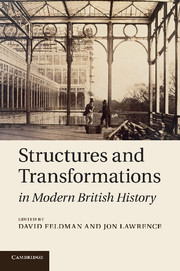Book contents
- Frontmatter
- Contents
- List of figures
- Notes on contributors
- Introduction: structures and transformations in British historiography
- 1 Coping with rapid population growth: how England fared in the century preceding the Great Exhibition of 1851
- 2 The ‘urban renaissance’ and the mob: rethinking civic improvement over the long eighteenth century
- 3 Forms of ‘government growth’, 1780–1830
- 4 Family formations: Anglo India and the familial proto-state
- 5 The commons, enclosure and radical histories
- 6 Engels and the city: the philosophy and practice of urban hypocrisy
- 7 The decline of institutional reform in nineteenth-century Britain
- 8 British women and cultures of internationalism, c.1815–1914
- 9 Psychoanalysis, history and national culture
- 10 Labour and the politics of class, 1900–1940
- 11 The dialectics of liberation: the old left, the new left and the counter-culture
- 12 Why the English like turbans: multicultural politics in British history
- Index
5 - The commons, enclosure and radical histories
Published online by Cambridge University Press: 04 February 2011
- Frontmatter
- Contents
- List of figures
- Notes on contributors
- Introduction: structures and transformations in British historiography
- 1 Coping with rapid population growth: how England fared in the century preceding the Great Exhibition of 1851
- 2 The ‘urban renaissance’ and the mob: rethinking civic improvement over the long eighteenth century
- 3 Forms of ‘government growth’, 1780–1830
- 4 Family formations: Anglo India and the familial proto-state
- 5 The commons, enclosure and radical histories
- 6 Engels and the city: the philosophy and practice of urban hypocrisy
- 7 The decline of institutional reform in nineteenth-century Britain
- 8 British women and cultures of internationalism, c.1815–1914
- 9 Psychoanalysis, history and national culture
- 10 Labour and the politics of class, 1900–1940
- 11 The dialectics of liberation: the old left, the new left and the counter-culture
- 12 Why the English like turbans: multicultural politics in British history
- Index
Summary
Few events in recent English social history have had such a central, and controversial, place as the enclosure of the common lands. Accounts of what E. P. Thompson once described as ‘a plain enough case of class robbery’, have divided historians in a way few other recent historical arguments have. This is not the place to go into these arguments in detail but we can separate two different elements. The first ‘strand’ is the idea that enclosure, by ending the open field system of agriculture, destroyed a peasant or yeoman class. This argument, it seems to me, is concerned mainly with the open fields. The second strand is that the common land or ‘waste’, which was part of the open field system of agriculture, was used by a much larger group than the ‘yeomen’ or peasant class, and this gave them a degree of economic independence. Enclosure, by removing the commons, economically damaged this group, reducing them to wage labour. In this chapter I am concerned only with the enclosure of the common or waste and its effect on the ‘labouring poor’.
As with the arguments about the end of a peasantry, most of this debate has centred on the period c. 1700–1850, and concentrated on the English Midlands. Looking at these areas and this period the argument has divided between those who saw the commons, and especially the common waste, as a resource for all the community, and those who focus on the so-called ‘commoners’.
Keywords
- Type
- Chapter
- Information
- Structures and Transformations in Modern British History , pp. 118 - 141Publisher: Cambridge University PressPrint publication year: 2011
- 3
- Cited by



